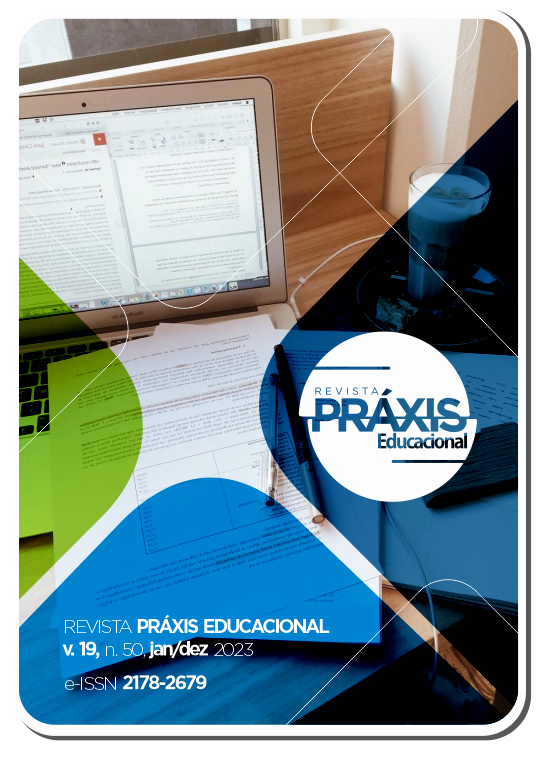Releasement as a determining feature in training in the technical era
DOI:
https://doi.org/10.22481/praxisedu.v19i50.11842Keywords:
philosophy of education, training, thinkingAbstract
The philosophical diagnosis of modernity presented by Heidegger, as a time of technical mastery, reveals the threat of a plastering of human possibilities to the logic of the calculative thinking, which finds objects to be explored, transformed and organized everywhere. Ultimately, the human being would no longer be able to consider himself except from this base of thinking, also becoming a resource of the technical world. Therefore, this article seeks to explore, based on bibliographical research, the possibility of self-training that may still be envisioned, based on the notion of releasement. This concept was introduced by Heidegger himself to name the disposition capable of breaking with the logic of the calculative thinking and enabling another way of thinking, the meditative one, which could keep human beings open to different ways of understanding themselves, their possibilities and the world as a whole. The article sustains the argument that the releasement reached through meditative thinking becomes, in the technical era, a fundamental requirement for human training understood as self-training.
Downloads
Metrics
References
BERNASCONI, Robert. Releasement (Gelassenheit). In: WRATHALL, Mark (ed.). The Cambridge Heidegger Lexicon. Cambridge: Cambridge University Press, 2021. p. 629-631.
BOLLE, Willi. A idéia de formação na modernidade. In: GHIRALDELLI JR., Paulo (org.). Infância, escola e modernidade. São Paulo: Cortez, 1997. p. 9-32.
CASANOVA, Marco Antonio. Nada a caminho: impessoalidade, niilismo e técnica na obra de Martin Heidegger. Rio de Janeiro: Forense Universitária, 2006.
DALBOSCO, Claudio Almir. Metamorfose do conceito de formação: da teleologia fixa ao campo de força. In: DALBOSCO, Claudio Almir; MÜHL, Eldon Henrique; FLICKINGER, Hans-Georg (org.). Formação humana (Bildung): despedida ou renascimento? São Paulo: Cortez, 2019. p. 35-64.
DALLE PEZZE, Barbara. Heidegger on Gelassenheit. Minerva – An Internet Journal of Philosophy, [s. l.], v. 10, 2006, p. 94-122. Disponível em: http://www.minerva.mic.ul.ie/vol10/Heidegger.html. Acesso em: 27 out. 2022.
DENKER, Alfred. “Serenidade”, o discurso festivo de Martin Heidegger: a questão da essência da técnica e do pensamento humano. Ekstasis: Revista de Hermenêutica e Fenomenologia, [s. l.], v. 9, n. 2, p. 127-146, out. 2020. Disponível em: https://www.e-publicacoes.uerj.br/index.php/Ekstasis/article/view/54556. Acesso em: 29 out. 2022.
DORO, Marcelo José. A formação humana no pós-humanismo: reflexões a partir da Carta sobre o humanismo de Heidegger. Educação, [s. l.], v. 45, n. 1, p. e53/ 1–20, 2020. Disponível em: https://periodicos.ufsm.br/reveducacao/article/view/35113. Acesso em: 29 out. 2022.
GOETHE, Wolfgang von. Os anos de aprendizagem de Wilhelm Meister. São Paulo: 34, 2006.
HAAR, Michel. Heidegger e a essência do homem. Lisboa: Instituto Piaget, 1990.
HEIDEGGER, Martin. Ensaios e conferências. 3. ed. Petrópolis: Vozes; Bragança Paulista: Editora Universitária São Francisco, 2006.
HEIDEGGER, Martin. Ser e tempo. 4. ed. Petrópolis: Vozes, 2009.
HEIDEGGER, Martin. Serenidade. Lisboa: Instituto Piaget, 2000.
INWOOD, Michael. Dicionário Heidegger. Rio de Janeiro: Jorge Zahar Editor, 2002.
JAEGER, Werner Wilhelm. Paidéia: a formação do homem grego. 3. ed. São Paulo: Martins Fontes, 1994.
MASSCHELEIN, Jan; RICKEN, Norbert. Do we (still) need the concept of Bildung? Educational Philosophy and Theory, [s. l.], v. 35, n. 2, p. 139-154, 9 jan. 2013. Disponível em: https://www.tandfonline.com/doi/abs/10.1111/1469-5812.00015. Acesso em: 29 out. 2022.
MOORE, Ian Alexander. Eckhart, Heidegger, and the imperative of releasement. Albany: State University of New York Press, 2019.
SARAMAGO, Ligia. Sobre a serenidade em Heidegger: uma reflexão sobre os caminhos do pensamento. APRENDER: Caderno de Filosofia e Psicologia da Educação, [s. l.], v. 1, n. 10, 2018. Disponível em: https://periodicos2.uesb.br/index.php/aprender/article/view/3134. Acesso em: 29 out. 2022.
SCHÜRMANN, Reiner. Heidegger and Meister Eckhart on Releasement. Research in Phenomenology, [s. l.], v. 3, 1973, p. 95-119. Disponível em: https://www.jstor.org/stable/24654259. Acesso em: 27 out. 2022.
SEVERINO, Antônio Joaquim. A busca do sentido da formação humana: tarefa da Filosofia da Educação. Educação e Pesquisa, São Paulo, v. 32, n. 3, p. 619-634, set./dez. 2006. Disponível em: https://www.scielo.br/j/ep/a/rhVxLn4XhLWjYJKXB7grswG/?lang=pt. Acesso em: 7 mar. 2023.
SPINELLI, Miguel. Ética e política: A edificação do éthos cívico da paideia grega. São Paulo: Edições Loyola, 2017.
VALENTI POSSAMAI, Fábio. A técnica e a questão da técnica em Heidegger. Intuitio, Porto Alegre, v. 3, n. 1, p. 20-32, jun. 2010. Disponível em: https://revistaseletronicas.pucrs.br/ojs/index.php/intuitio/article/view/6790. Acesso em: 29 out. 2022.
Downloads
Published
How to Cite
Issue
Section
License
Copyright (c) 2023 Práxis Educacional

This work is licensed under a Creative Commons Attribution-ShareAlike 4.0 International License.
You are free to:
Share - copy and redistribute the material in any medium or format; Adapt - remix, transform, and build from the material for any purpose, even commercially. This license is acceptable for Free Cultural Works. The licensor cannot revoke these freedoms as long as you follow the terms of the license.
Under the following terms:
Attribution - You must appropriately give credit, provide a link to the license, and indicate if any changes have been made. You may do so in any reasonable way, but not in a way that suggests that you or your use is endorsed by the licensor.
There are no additional restrictions - You cannot apply legal terms or technological measures that legally restrict others to make any use permitted by the license.










